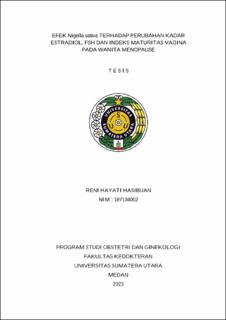| dc.description.abstract | Background: Approximately 75% of postmenopausal women experience complaints of vaginal atrophy, a condition that tends to worsen without treatment, negatively impacting their quality of life. Estrogen deficiency leads to decreased vascularization, the vaginal maturity index, and glandular secretion. The estrogenic effect of Nigella sativa has been extensively studied in experimental animals, but there is limited research on humans. To investigate the effects of Nigella sativa on changes in estradiol levels, FSH, and the vaginal maturity index in menopausal women.
Methods: This study employed an analytical research with quasi experimental design. Subjects were selected through a non-randomized single-blind of consecutive sampling. The subjects were menopausal women divided into three groups: K1 (control receiving a placebo), K2 (Nigella sativa at a dose of 910 mg/day), and K3 (Nigella sativa at a dose of 1.365 mg/day) for 2 months. Estradiol levels, FSH, and the vaginal maturity index were measured in all three groups.
Results: A mean age of study subjects 55.40 ± 3.17 and a duration of menopause of 5.20 ± 2.2. The comparison of estradiol levels before and after intervention showed significant results (p: 0.001) compared to the control group, but there was no significant difference in estradiol levels between K2 and K3 (p: 0.12). The comparison of FSH levels before and after intervention did not reveal significant differences (p: 0.9; p: 0.146). The comparison of the vaginal maturity index before and after intervention showed significant results (p: 0.007) compared to the control group, but there was no significant difference in the vaginal maturity index between K2 and K3 (p: 0.763).
Conclusion: Administration of Nigella sativa significantly increased estradiol levels and the vaginal maturity index in menopausal women compared to the control group, while FSH levels did not differ significantly. | en_US |





